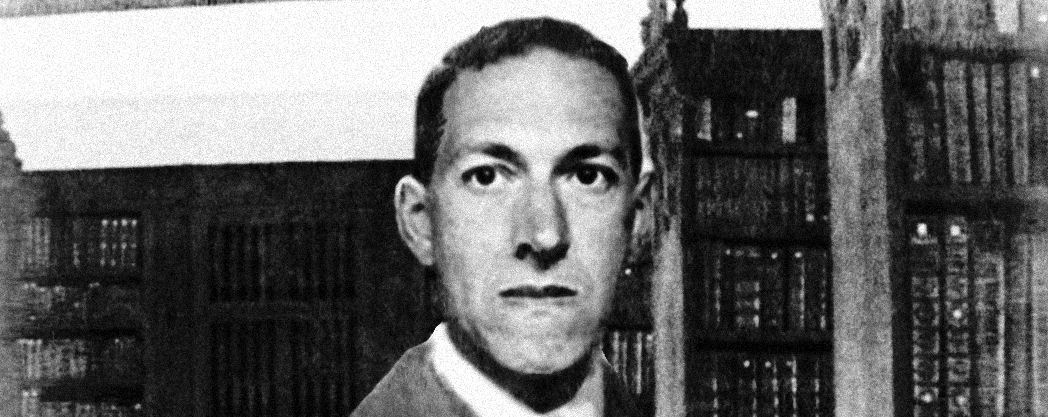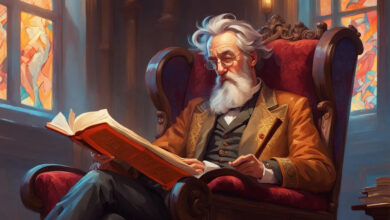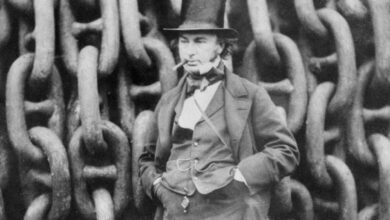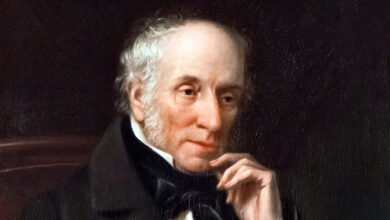
“The process of delving into the black abyss is to me the keenest form of fascination.” – H. P. Lovecraft
Podcast: Play in new window | Download
Subscribe: Spotify | Amazon Music | Youtube Music | RSS
H. P. Lovecraft Biography
Born on the 20th August 1890, H. P. Lovecraft was a poet and pulp fiction writer who lived and died in near-literary obscurity and poverty. His life was brief, filled with physical and mental illness, personal loss, and spurts of literary creativity. Despite the near obscurity of his life, he is known around the world today as one of the fathers of modern horror fiction.
Howard Phillips Lovecraft was the only child of parents already in their thirties when he was born in Providence, Rhode Island. Winfield Scott Lovecraft, his father, was a traveling salesman. Sarah Susan Phillips Lovecraft, his mother, was a New Englander who could trace her family ancestry back to the Massachusetts Bay Colony of 1631.
Lovecraft was only three years old when his father was committed to a psychiatric institution. Winfield Lovecraft would spend his remaining years at the institution, dying there in 1898, when Howard was only eight years old. Sarah Lovecraft, his two maternal aunts and his maternal grandfather would share in raising young Howard in the family home.
The prodigious Howard was reciting poems at age three and writing poetry at six years. His grandfather encouraged his reading and fueled young Howard’s imagination with mind-stirring stories of Gothic horror of his own creation. Frequent illnesses kept Howard from attending public school for much of his childhood. He developed a voracious childhood reading habit during these extended confinements and was considered a well-educated teenager by the time he entered public high school.
Howard’s family grew even smaller with the passing of his treasured grandfather in 1904 and family was forced to move to a smaller residence in Providence.
Lovecraft’s childhood was not only occupied by illness; he also suffered from what he referred to as “horrific night gaunts,” which may have been a form of parasomnia. He also experienced a nervous breakdown shortly before he was to receive his high school diploma.
After leaving high school, Howard spent five years in near-isolation, surrounded only by the network of his mother and aunts. His time was primarily occupied with writing poetry and letters of complaint to the pulp magazine, The Argosy. His letters attracted the attention of the president of the United Amateur Press Association who invited Lovecraft to become a member of the association in 1914.
It was through this association that Lovecraft began contributing poems and essays and achieving his first publication, The Alchemist, which appeared in the United Amateur. His earliest commercially published work appeared in 1922.
Years of near-isolation did not mean that he was without connections. Lovecraft had begun writing letters in his teens and by age 32 he had developed a voluminous correspondence. He would eventually be considered by some as, “one of the great letter writers of the century,” having penned an estimated 100,000 letters in his lifetime.
Personal loss continued to haunt Lovecraft. His mother had suffered from hysteria and depression for years. She was committed in 1919 to the same mental institution as her late husband and would die there in 1921 of complications from gallbladder surgery.
Many children are drawn to tales of horror but Lovecraft seemed to have lived a certain kind of childhood terror. His night terrors developed early in childhood and his grandfather spun particularly vivid and weird tales.
Shortly after his mother’s passing, Lovecraft met and married Sonia Greene, a milliner with her own hat shop in Brooklyn, New York. He moved in to her apartment where his bride willingly financially supported him while he continued his sporadic writing. With the encouragement of his new network of intellectual and literary friends he submitted stories to Weird Tales.
Unfortunately, Sonia’s business failed, along with her assets in a bank failure, and she fell ill. Lovecraft was already 34, yet lacked any reasonable level of marketable work skills. Sonia eventually recovered her health and relocated to Ohio where her new employment required nearly continuous travel. They would ultimately divorce.
Lovecraft remained in a single room apartment in New York where he found, “a sense of horror and oppression which threatened to master, paralyze, and annihilate me”. Despite this terror, he wrote the outline for what would eventually become one of his masterpieces of horror fiction, “The Call of Cthulhu,” centered on a theme of the “insignificance of all humanity”. He would return to this theme in many of his later stories and poems.
Lovecraft returned to Providence where he would spend the last decade of his life and this period would be his most literary prolific although this didn’t seem to help him pay the bills as he wasn’t that great at marketing his work for sale.
Lovecraft lived frugally and moved to increasingly limited accommodations. The only thing that remained full in his life was his correspondence. In 1936, he was diagnosed with cancer of the small intestine and lived in constant pain until his death on 15th March, 1937.
In many respects, the details of his life are as nearly ordinary as his fiction was extraordinary. Many of his stories contained themes of deep despair – a near fatalism that descendants will or must suffer horrifically for crimes committed by their forebears. Lovecraft’s protagonists often have no control over their own actions, unable to flee even if such action would free them from danger. Many of his characters are victims of incredible, powerfully malevolent supernatural beings.
Though not a household name or an acknowledged “literary lion,” H. P. Lovecraft is celebrated by horror and science fiction writers, film makers, and horror aficionados decades after his death and has achieved recognition as the quintessential master of horror fiction.
Podcast: Play in new window | Download
Subscribe: Spotify | Amazon Music | Youtube Music | RSS




